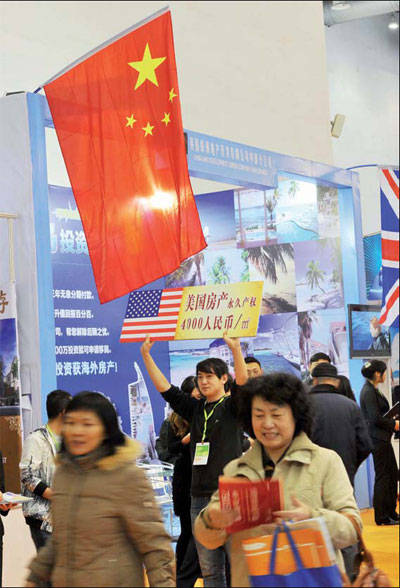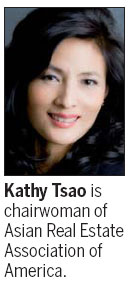Chinese buying premium US properties
Updated: 2012-04-27 07:39
By Wang Chao (China Daily)
|
||||||||
|
An employee promotes US properties at a recent property fair in Dalian. Provided to China Daily |
China is the second biggest group of foreign investors in American homes
International buyers now account for more than 20 percent of the United States real estate market, with a significant proportion from China, according to a recent survey by the Asian Real Estate Association of America (AREAA).
Among all deals closed during the past 12 months, 30 percent were for premium homes valued at more than $1 million, the survey showed.
Ever since the US real estate market bubble burst in 2008, agents have seen prices plunge 30 percent and buyers' confidence erode. But strong demand from Chinese and other international buyers has boosted an otherwise bleak market.
Kathy Tsao, chairwoman of AREAA and a real estate agent for 30 years, says she started noticing the "Chinese buying trend" 10 years ago.
"The amount has really picked up in the past three to five years," Tsao says. "Most of my buyers are from Shanghai, Beijing and, of course, Hong Kong. I have also had buyers from Guangzhou."
Figures from the National Association of Realtors show that China has become the No 2 international investor in US properties in terms of buyers at 9 percent, after Canada's 23 percent. And China has supplanted South Korea as the top country with applicants for EB-5 visas - set aside by the US government for immigrant investors who establish commercial enterprises.
|
|
The realtors association found that foreign clients spent $41 billion buying houses and apartments in the US between March 2010 and March 2011. Counting new immigrants and holders of visas for more than six months, the number rose to $82 billion, up 24 percent year-on-year.
Philip White, president and chief operating officer of Sotheby's International Realty Affiliates LLC, a luxury property broker, says that during the past five years international buyers have increased to around 20 percent of the total transactions Sotheby's closed.
While the motivations of these buyers vary, the strength of their home-country currencies against the US dollar is a key factor because it makes purchases relatively inexpensive, White says.
"A stable political environment and a mature education system are other draws for these foreigners," he adds.
International buyers prefer properties in metropolises such as New York, Los Angeles, San Francisco and Miami, brokers say. For instance, Brazilians tend to congregate in South Florida, while Chinese customers seek properties in the Bay Area.
"The city is closer to China, the weather is warmer and there is a large established Chinese community," White says of San Francisco. "I guess that's why Chinese investors flock to buy properties there."
New York City's priciest borough is another favorite for Chinese buyers, Tsao says.
"Many of my customers are purchasing properties because their children will be attending school in the city. Most of them are attending Ivy League schools on the East Coast. So a property in Manhattan is an ideal situation for them."
Chinese buyers are looking for good quality and are willing to pay a fortune for it, brokers say. The properties they seek are spacious and costly, typically exceeding $1 million.
"Some are also looking to purchase for long-term investment. Some are in the luxury market ($5 million range) to find a second home near the Central Park South and West area, Carnegie Hill, etc," Tsao says.
Hiroko Akutsu Lee, a New York broker with Prudential Real Estate Affiliates who mainly sells houses and apartments on Long Island, says Chinese have replaced Japanese buyers as her primary clientele in recent years.
Chinese buyers tend to prefer paying cash rather than taking out mortgages, Lee says. She once saw a Chinese customer buy a house on Long Island with $1.2 million in cash.
"Twenty years ago, Japanese came to buy properties. But after the burst of the real estate bubble in Japan, their enthusiasm in properties subsided," Lee says. Since the March 2011 earthquake and tsunami, Japanese have become even more cautious about potential purchases abroad.
Despite allegations that some Chinese investors have brought hot money into the US market and helped create a bubble, industry analysts deny this is the case. In fact, they say, Chinese buyers have eased the inventory pressure and helped perk up a sluggish market.
"We are happy to have these Chinese buyers," White says. "So far, I haven't seen any sign they have disturbed the market; in fact, they helped stabilize it."
Even politicians have turned their eyes to international buyers in an attempt to revitalize the real estate sector.
Senators Charles Schumer and Mike Lee, a New York Democrat and a Utah Republican, introduced an immigration bill in October that would grant a US visa to any international investor who spent at least $500,000 on residential real estate in the country. So far no action has been taken on the legislation.
The big demand from Asian communities is leading to a quiet shuffle within the industry as well. Alan Parter, president of Alan Parter International Inc, which helps international companies register and operate in the US, says he is increasingly getting requests from brokers in China - many from Hong Kong - to establish a US presence to serve the needs of potential property buyers.
As more Chinese become affluent, this trend will continue, Tsao from AREAA predicts. "I think there is still much more potential, with the (yuan) appreciation, and more people to diversify their investment portfolios."
She adds that housing policies back home, which limit the number of properties each citizen can own, has also led to increased demand.
To curb the soaring properties prices in major cities and minimize the bubble, China's government has implemented a series of policies since 2009 to restrain what it considers excessive investment in real estate.
Despite the "somewhere near the bottom" property prices, as the Mortgage Bankers Association President David Stevens said, financing policies affecting Chinese customers aren't optimal.
Since the US real estate bubble burst, most major banks have suspended loans for foreigners (with a few exceptions for Canadian citizens). Those that still offer programs impose much stricter terms on foreign investors than domestic ones.
Stevens believes there shouldn't be a differentiation between American citizens and international buyers, except for serious security considerations. "Equal chances should be granted to both domestic and international buyers," he said.
His viewpoint is backed by Wells Fargo Home Mortgage banker Brad Blackwell: "Too-restrictive regulations will end up in fewer players, and fewer sources of lenders. Eventually the market will perform the opposite of what the government had intended to gain."
wangchao@chinadaily.com.cn

 Relief reaches isolated village
Relief reaches isolated village
 Rainfall poses new threats to quake-hit region
Rainfall poses new threats to quake-hit region
 Funerals begin for Boston bombing victims
Funerals begin for Boston bombing victims
 Quake takeaway from China's Air Force
Quake takeaway from China's Air Force
 Obama celebrates young inventors at science fair
Obama celebrates young inventors at science fair
 Earth Day marked around the world
Earth Day marked around the world
 Volunteer team helping students find sense of normalcy
Volunteer team helping students find sense of normalcy
 Ethnic groups quick to join rescue efforts
Ethnic groups quick to join rescue efforts
Most Viewed
Editor's Picks

|

|

|

|

|

|
Today's Top News
Chinese fleet drives out Japan's boats from Diaoyu
Health new priority for quake zone
Inspired by Guan, more Chinese pick up golf
Russia criticizes US reports on human rights
China, ROK criticize visits to shrine
Sino-US shared interests emphasized
China 'aims to share its dream with world'
Chinese president appoints 5 new ambassadors
US Weekly

|

|








